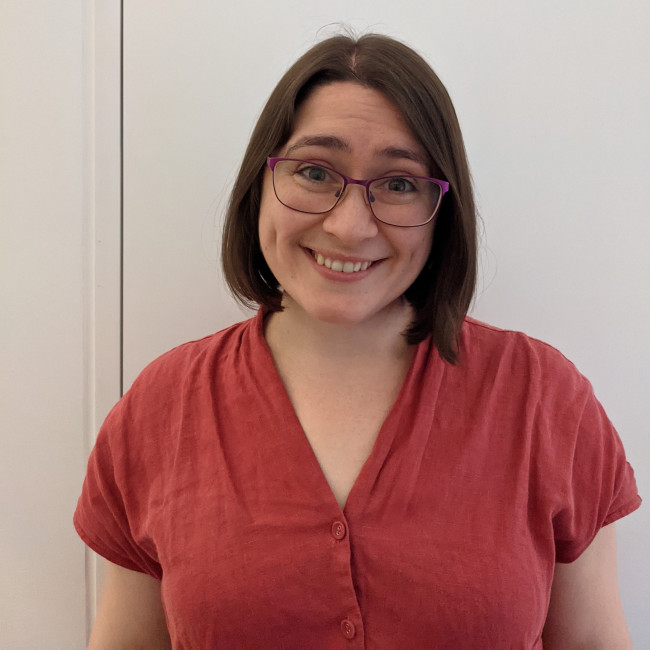Dr Clare Walker Gore
College Assistant Professor and Director of Studies in English
Subjects: English

Clare is a College Assistant Professor and Director of Studies in English at Lucy Cavendish.
She read English at Selwyn College, Cambridge, where she went on to study for her MPhil and PhD. Before coming to Lucy, she held a Junior Research Fellowship at Trinity, where she was also a College Lecturer and Director of Studies, and she has also held a lectureship at the Open University.
Research Interests
Clare works mainly on the Victorian period, particularly on Victorian novels. Her current project explores life writing by and about female novelists in the Victorian period: she is interested in how women novelists 'plot' their lives in their auto/biographies, and how they responded to one another's fictional and non-fictional portrayals of women writers' lives. So far, she is looking at work by and about a mixture of very well known novelists – including Elizabeth Gaskell, Charlotte Brontë, and George Eliot – and some brilliant but now relatively neglected writers, including Margaret Oliphant and Charlotte Yonge. You can hear her talking about some aspects of this research on the radio 3 here and here.
Clare's previous project, which started out as a doctoral thesis and turned into her first book, examined the role of disabled characters in the nineteenth-century novel. She wanted to see whether characters' capacity to function in narrative terms was curtailed by the attribution of a social identity based on incapacity. In fact, she found the opposite to be the case: disabled characters perform a wide variety of narrative roles in the Victorian novel, and disability functioned as an enabling concept for nineteenth-century novelists, used to test the possibilities and limitations of the marriage plot, to explore questions of social and narrative justice, and to probe the connection between embodiment and identity. You can hear more about this research in this episode of Free Thinking on Radio 3.
Beyond these specific projects, Clare is generally interested in the development of the novel, in in popular fiction, in writing by and about women, and in disability studies. Clare mainly teaches Part I Papers 1 (practical criticism), 6 (1660-1870), and 7a (1830-1945), and Part II Papers 1 (practical criticism) and 10 (1847-1872). She supervises dissertations on a range of eigtheenth-, nineteenth- and twentieth-century topics.
Selected Publications
Monograph
- Plotting Disability in the Nineteenth-Century Novel (Edinburgh University Press, 2019)
Edited Collection
- Charlotte Mary Yonge: Writing the Victorian Age, co-edited with Clemence Schultze and Julia Courtney (Palgrave Macmillan, 2023)
Critical Edition
- Dinah Mulock Craik, A Noble Life (Victorian Secrets, 2016)
Articles
- ‘Why don’t he send the girl to the Asylum?’: Adaptation, Disability and the Social Body in Boucicault’s Dot and The Colleen Bawn’, Nineteenth-Century Theatre and Film, 49.2, Special Edition on Dion Boucicault (November, 2022), 126–143
- ‘Unbroken health and a spirit almost criminally elastic’: Women’s Work and Women’s Bodies in the Autobiographies of Harriet Martineau and Margaret Oliphant”, Women's Writing, 27.4, Special Edition on Women and Labour in the Nineteenth Century (December 2020), 473-483
- ‘The Additional Attraction of Affliction: Disability, Sex and Genre Trouble in Barchester Towers’, Victorian Literature and Culture, 3 (August 2017), 629-643
- ‘Noble Lives: Writing Masculinity and Disability in the Late Nineteenth Century’, Nineteenth-Century Contexts, 36.4 (September 2014), 363-375
- ‘“Setting Novels at Defiance”: Novel Reading and Novelistic Form in Charlotte M. Yonge’s The Heir of Redclyffe’, Nineteenth-Century Gender Studies, 10.1 (Spring 2014)
Book Chapters
- ‘“My chair is me”: Mobility Devices in the Victorian Novel’, The Oxford Companion to Disability and English Literature, ed. Essaka Joshua (forthcoming from Oxford, 2024)
- ‘“They all revolved about her”: Disability, Femininity and Power in Mid-Nineteenth-Century Women’s Writing’, The Routledge Companion to Literature and Feminism, ed. Rachel Carroll and Fiona Tolan (forthcoming from Routledge, 2023)
- ‘Bodily Suffering and Peculiar Glory: Deafness, Isolation and Identity in the Writings of Harriet Martineau’, in Ear Pieces: Literary Fiction and Hearing Technology, ed. Edward Allen (forthcoming from Routledge, 2023)
- ‘“A lady with a profession”: The Governess, the Invalid, and the ‘Woman Question’ in the Novels of Charlotte M. Yonge’, in Charlotte M. Yonge: Writing the Victorian Age, co-edited with Clemence Schultze and Julia Courtney (Palgrave Macmillan, 2023), pp. 85–103
- ‘“Our Ordinary Lot”: The Cross, the Crutch and the Theology of Disability in the Novels of Charlotte M. Yonge’, in The Figure of Christ in the Nineteenth Century, ed. Elizabeth Ludlow (Palgrave Macmillan, 2020), pp. 195-207
- ‘“Of wonderful use to everybody”: Disability and the Marriage Plot in the Nineteenth-Century Novel’, in The Routledge Companion to Literature and Disability, ed. Alice Hall (Routledge, 2020), pp. 120–131
- ‘“That very ugly saddle”: Disability, Adaptation and Paternal Inheritance in The History of Sir Richard Calmady’, in Lucas Malet, Dissident Pilgrim: Critical Essays, ed. Alexandra Gray and Jane Ford (Routledge, 2019), pp. 52-68
- ‘“Excluded from a woman’s natural destiny”: Disability and Femininity in Dinah Mulock Craik’s Olive and Charlotte M. Yonge’s The Daisy Chain’, in Reassessing Women’s Writing of the 1840s and 1850s, Adrienne E. Gavin and Carolyn W. de la L. Oulton (Palgrave Macmillan, 2018), pp. 153-166
- ‘“The Awful Individuality of Suffering”: Disabled Characterisation in Dinah Mulock Craik’s Olive and A Noble Life’, in The Variable Body in History, ed. Chris Mounsey and Stan Booth (Peter Lang, 2016), pp. 203-229
- ‘“The right and natural law of things”: Disability and the Form of the Family in the Fiction of Dinah Mulock Craik and Charlotte M. Yonge’, in Queer Victorian Families: Curious Relations in Literature, ed. Duc Dau and Shale Preston (Routledge, 2015), pp. 116-133



